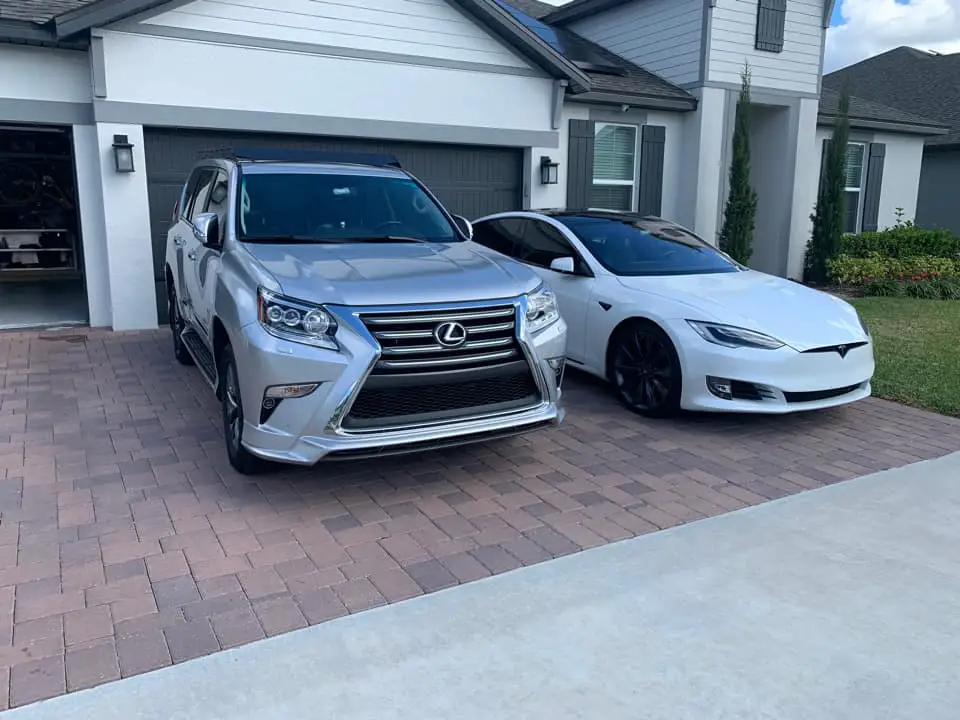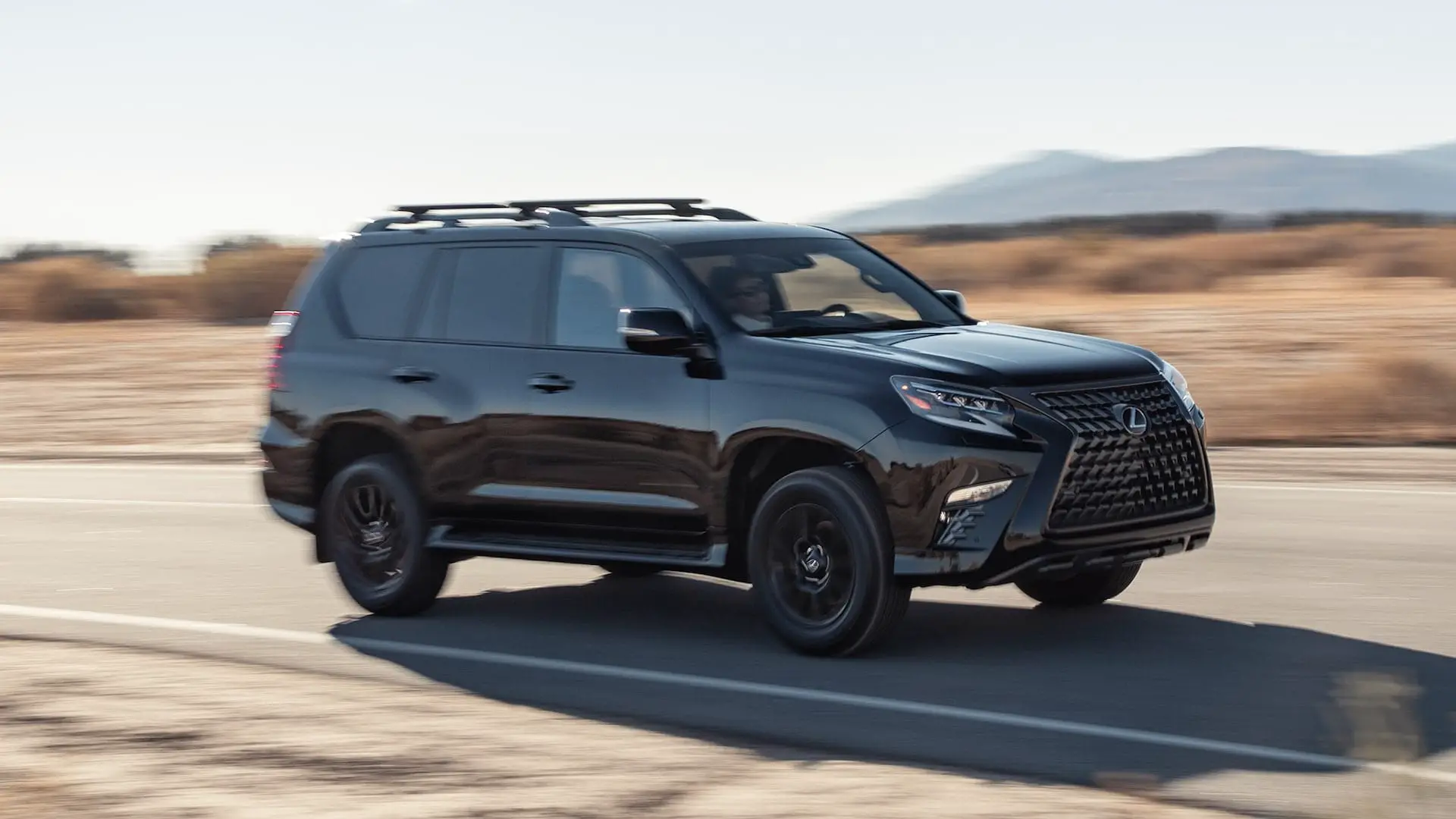If you don’t use premium gas in your Lexus, the car could have decreased power and performance. Over time, this could lead to engine damage. While lower-octane gasoline won’t damage the engine outright, it can cause knocking and pinging sounds as the air/fuel mixture detonates prematurely in the cylinders.
Thankfully, not all Lexus automobiles require premium gas. Generally speaking, the more entry-level Lexus models do not require premium fuel.
You can always consult your local Lexus dealer or owner’s manual to be 100% sure.
What Is Considered Premium Gas?
Premium gas contains a higher octane rating number. Premium fuel can have a rating of 90, 91, or 94 or higher octane. Regular gas is usually 87 octane. But the exact numbers can vary based on what is deemed appropriate for your altitude and location.
The fuel pump has a yellow sticker that shows the octane rating of the fuel the station sells. Be sure to check this BEFORE fueling.
The octane sticker on the gas pump will show you what is premium in your state. This sticker should match the minimum recommended octane rating for your Lexus. Most Lexus models will require either regular fuel at an octane rating of 87 or premium at a rating of 91 (or higher).
The FTC requires fuel pumps have a yellow sticker that displays the minimum octane rating for the fuel.
This article by US Energy Information Administration provides an in-depth look into what octane ratings are. Be sure to check it out if you want additional detail.
Accidentally Fill Up With Regular Gas?

If you accidentally fill up with regular gas, don’t worry, just drive like normal and use Premium fuel during your next fill-up.
Lexus requires high octane gas for its performance cars, such as the coupes, and the more premium sedans and SUVs within the lineup.
These cars have high compression engines that can have issues if you use lower octane gas.
According to Jalopnik, “if an engine has a high compression ratio, it means that air and fuel in the cylinder is being squeezed into a much smaller space than an engine with a lower compression ratio.”
If you continue using regular gas, the performance of your car will suffer, and so will the fuel economy. Even worse, regular gas makes your car’s engine more prone to long-term issues.
Can You Use Regular Gas When The Manufacturer Requires Premium Fuel?
Yes, you can use whatever gas you want. The decision is completely up to you, but if you want to keep your vehicle in the best shape mechanically and ensure it lasts a long time, you should follow what the manufacturer recommends and what is stated in your manual.
You may also notice a knocking sound coming from your engine. This is because the air/fuel mixture is detonating prematurely or the balance of fuel is off. Premature detonation can cause damage to your engine over time.
The knocking sound begins softly and gradually increases in intensity where it will eventually become more noticeable, leading to damage to the ignition system components within the engine.
The bottom line is, if Lexus requires that you use premium gas, do not use regular gas and save yourself the potential headaches of having to have expensive work done on your engine. If your engine sustains damages from the use of regular gas, you void your warranty. This means you would be out of pocket for the complete repair (parts and labor), and all of that would cost much more than what you save using regular fuel.
What Lexus Models Require Premium Gas?
Lexus “Recommends” that you use premium gasoline on certain models. If this is the case, generally regular gas will not harm your engine (but use it at your own risk).
Premium gasoline will make your automobile perform somewhat better and potentially get you a few more miles per gallon, but there’s also the question of how much more you’ll have to spend for premium fuel. A gallon of premium gasoline costs, on average, 10% more.
On some models, Lexus “requires” that you use premium gasoline. These are cars with engines that are built to run on high-octane gas and operate without detonation. If your Lexus only needs premium fuel, you have no choice but to use premium gas since otherwise your automobile’s engine would be damaged.
The models that require premium gas are:
GX 460
Lexus NX
Lexus LX
Lexus IS, GS and LS Sedan
Lexus RC and LC Coupes
Can I Use Regular Gas If My Lexus Recommends Premium Gas?
If your car’s owner’s manual recommends premium gas, you can use regular gas, but the car may not run as efficiently. Premium gas has a higher octane rating than regular gas, which means it can resist higher levels of compression before igniting.
This can be beneficial for high-performance engines that rely on higher levels of compression to generate more power. However, if your car’s engine is designed to run on regular gas, using premium gas will not provide any benefits. In fact, it may actually decrease fuel economy and increase emissions. If you’re unsure whether to use regular or premium gas in your car, consult your owner’s manual or dealer for advice.
Is Premium Gas Better for the Health of My Engine?
Is premium gas better for your engine is a difficult question to answer. Some say that it is, and some say it is not. The fact is that most engines are designed to run on regular unleaded gasoline. However, if your vehicle manufacturer recommends the use of premium gasoline, then it is probably because the higher octane level will help to prevent knocking or pinging during engine operation. When this happens, it can cause damage to the engine over time.
The premium gas does not prevent engine deposits, remove them, or clean your car’s engine any more than regular gasoline.
The EPA requires that all gasoline brands and qualities include engine cleaning chemicals to clean your engine and prevent deposit buildup. This way, whether you use high-grade or regular fuel, your automobile will be protected from deposits.
Do Other Luxury Brands Require Premium Fuel Or Is This Unique To Lexus?
In addition to Lexus, this also includes Audi, Volkswagen, BMW, Mini Cooper, Porsche, and Mercedes Benz, all of which require premium fuel for most vehicles in their lineup. Some luxury brands do have some entry-level models that use regular fuel, but on average, premium fuel is required. Be sure to check your owner’s manual to ensure that you are following what is best for your vehicle and if unsure contact your local dealer.
Closing Thoughts
To generalize, avoid using fuel with an octane rating that is below the minimum recommended by the auto manufacturer. You can see the recommended octane rating of your Lexus GX or any other model on the user manual of your Lexus. When you are talking about the longevity of your vehicle, saving a few dollars on fuel is not always the best decision.


